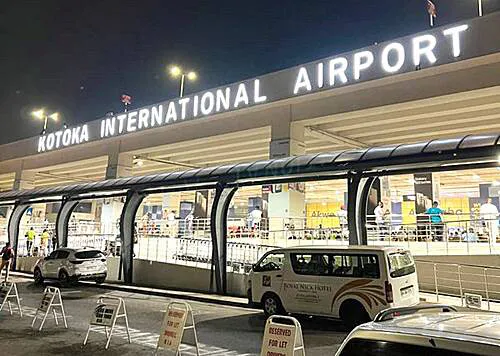A heated debate has erupted on social media between two respected legal and academic minds—Prof. Stephen Kwaku Asare and H. Kwasi Prempeh—over the recent legal challenge against the attachment of the name Kotoka to Ghana’s International Airport (KIA), with broader implications for Ghana’s historical memory and national identity.
On Monday, February 24, 2025, the Democracy Hub, in collaboration with the Convention People’s Party (CPP), filed a suit at the Supreme Court, arguing that retaining Kotoka’s name on the airport contradicts Ghana’s democratic values.
The plaintiffs contend that the name signifies state endorsement of unconstitutional actions, particularly Kotoka’s role in the overthrow of Ghana’s first president, Dr. Kwame Nkrumah, in 1966.
The conversation on Social media in relation to this development was ignited by Prof. Asare, widely known as Kwaku Azar, who questioned the logic behind renaming places named after coup leaders under the 1992 Constitution, arguing that it could set a precedent that would apply to other figures like Kwame Nkrumah, who led Ghana into a one-party state in 1964.
“Article 3(1) rejects a one-party state. Nkrumah led Ghana into one in 1964. So why does KNUST still bear his name?” Prof. Kwaku Asare asked in a Facebook post, drawing attention to what he perceives as selective historical scrutiny.
He further contended that if Article 3(3) of the Constitution, which frowns on coups, is being used to justify renaming places named after coup leaders, then the same logic should apply to institutions named after Nkrumah, since the Constitution equally rejects a one-party state.
A Constitutional Distinction
However, his argument was met with strong opposition from H. Kwasi Prempeh, a distinguished legal scholar, and Executive Director of the Centre for Democratic Development(CDD-Ghana), who drew a sharp distinction between the two cases.
“There is an important difference. A coup d’état is ab initio unconstitutional. Not so with a one-party state. Nkrumah’s one-party state was established in accordance with the appropriate constitutional process at the time,” H. Kwasi Prempeh countered.
He further emphasized that Nkrumah’s tenure spanned multiple governance phases, from 1951 to 1966, with the one-party state representing only a fraction of that period. In contrast, Kotoka’s legacy is inextricably linked to the 1966 coup, which directly overthrew constitutional rule.
A Dangerous Precedent?
But Prof. Asare was unconvinced. Returning to the debate, he insisted that both coups and one-party states are unconstitutional under the 1992 Constitution, which serves as the basis for the proposed renaming.
“In reality, many things can be established through constitutional processes—modern coups, for instance, are often effectuated by tinkering with the Constitution. A lot of third and fourth terms are all coups in disguise!” he argued, warning against selective historical revisionism.
Prof. Kwaku Asare also questioned why Kotoka’s legacy is solely defined by the coup, while Nkrumah’s is viewed in a broader context.
“Why should naming something after Kotoka be tied to the coup rather than to his valor at the airport or in the Congo? Why must his legacy be solely linked to the coup?” he asked.
Ultimately, he warned that using the 1992 Constitution as a selective anchor for renaming institutions could set a “dangerous precedent”, raising concerns about what he calls historical cherry-picking and the long-term impact on national identity.
Below is the Facebook discussion by the two personalities
